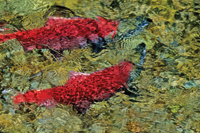forum
library
tutorial
contact

Endangered Species
by Dick DorworthIdaho Mountain Express, March 2, 2011
|
the film forum library tutorial contact |

|
Endangered Species
by Dick DorworthIdaho Mountain Express, March 2, 2011 |
"We find ourselves ethically destitute just when, for the first time, we are faced with ultimacy, the irreversible closing down of the earth's functioning in its major life systems. Our ethical traditions know how to deal with suicide, homicide and even genocide, but these traditions collapse entirely when confronted with biocide, the killing of the life systems of the earth, and geocide, the devastation of the earth itself."--Thomas Berry
"We believe that modern society cannot continue to operate on the premise that all species must be preserved at any cost. ... Recovery of threatened or endangered (T/E) species should not receive higher priority than human uses or rights. ... We believe basic requirements of human life have priority over protection of other species, including T/E species. ... Anadromous hatchery fish and wild fish should be treated equally under the ESA. Hatchery fish should be counted toward recovery of the species. We support eliminating the marking of hatchery fish. ... We oppose implementation of the endangered species pesticide labeling program, other than in critical habitat. ... We oppose the listing of the giant Palouse earthworm as an endangered species."
 "Ethically destitute" is a powerful reflection of the entire human species. Berry, a Catholic priest who died at 80 in 2009, was a gifted thinker, scholar, writer and fierce advocate for what he called "the Earth Community." In stark contrast to the policy of the Idaho Farm Bureau, among other business entities, Berry believed that life on earth works best--and in fact will only survive--as a democracy in which the life of one species does not have priority over all others. He wrote eloquently about his realization that the degradation of nature goes hand in hand with the diminishment of man to a degree he termed "ethically destitute."
"Ethically destitute" is a powerful reflection of the entire human species. Berry, a Catholic priest who died at 80 in 2009, was a gifted thinker, scholar, writer and fierce advocate for what he called "the Earth Community." In stark contrast to the policy of the Idaho Farm Bureau, among other business entities, Berry believed that life on earth works best--and in fact will only survive--as a democracy in which the life of one species does not have priority over all others. He wrote eloquently about his realization that the degradation of nature goes hand in hand with the diminishment of man to a degree he termed "ethically destitute."
Strong words describing consequential facts. Extinction is forever and every day nearly a hundred species of life become extinct on Earth. Day after day. Month after month. Year after year. Almost all of these extinctions are a consequence of the anthropocentric idea that human life has priority (to the point of extinction) over other forms of life. That idea, so far as it goes, is succinctly expressed by the Idaho Farm Bureau's policy statement: "We believe that modern society cannot continue to operate on the premise that all species must be preserved at any cost."
I agree to the extent that modern society cannot continue to operate on the premise(s) it currently uses. Modern society needs to change in significant ways in order that all species can be preserved. Modern society cannot continue to operate on the ethically destitute premise that economies of scale take precedence over the life of the planet. In addition to the ethical questions involved in terms of what words like "biocide" and "geocide" indicate about the human species' relationship to its mother Earth and all the other species she supports, there are the inextricably related issues of how the loss of each species affects the health of the planet and all the remaining species. That includes, but is far from limited to, the question of human survival. Berry viewed the entire Earth as a community composed of all forms of life entwined together and dependant on each other. This seems an accurate observation of how nature on Earth works, or at least worked for several million years. Two thousand years ago, there were approximately 300 million people on the planet. In 1800, there were approximately 1 billion of us. Today, there are nearly 7 billion humans on the earth and growing at a rate of more than 135,000 each day, which adds up to nearly 10 million every year.
The Idaho Farm Bureau is doing its part to feed some of those people and should be applauded for doing so, but the applause turns to boos, hisses and jeers when their policies are at the expense of the survival of, for instance, the anadromous fish (sockeye salmon). Before the dams on the Snake and Columbia rivers and the agricultural runoff, including pesticides, turned those pristine waterways into polluted barge canals, some 25,000 sockeye swam each year from the Pacific Ocean to Redfish Lake to spawn, doing their part for the Earth Community. Two years ago, 23 sockeye made it to Redfish.
And the giant Palouse earthworm plays an important role in the health of the soil, which, after all, is a key member of the Earth Community, especially for farmers. One member of the Idaho Farm Bureau, Craig Fleener, is reported by National Public Radio to believe that "... the country is moving toward socialism, and any effort to list the worm as endangered is a step in that direction."
I would rather see healthy soil, clean running rivers and anadromous fish swimming to Redfish Lake each year than a modern society in which its spokespeople purposely confuse the environmental health of the entire Earth Community with the narrow political ideology of a few of its members.
learn more on topics covered in the film
see the video
read the script
learn the songs
discussion forum
